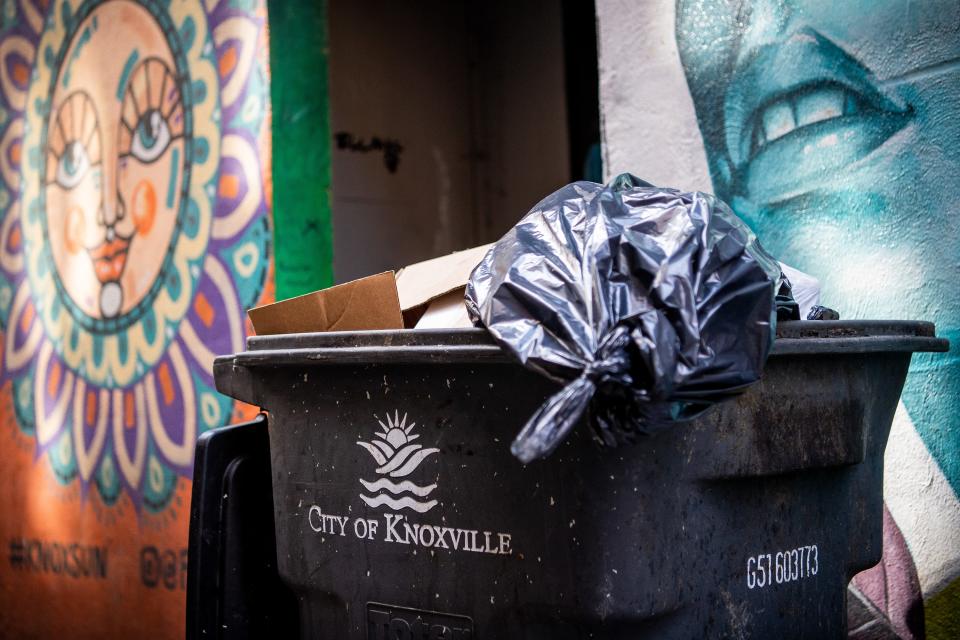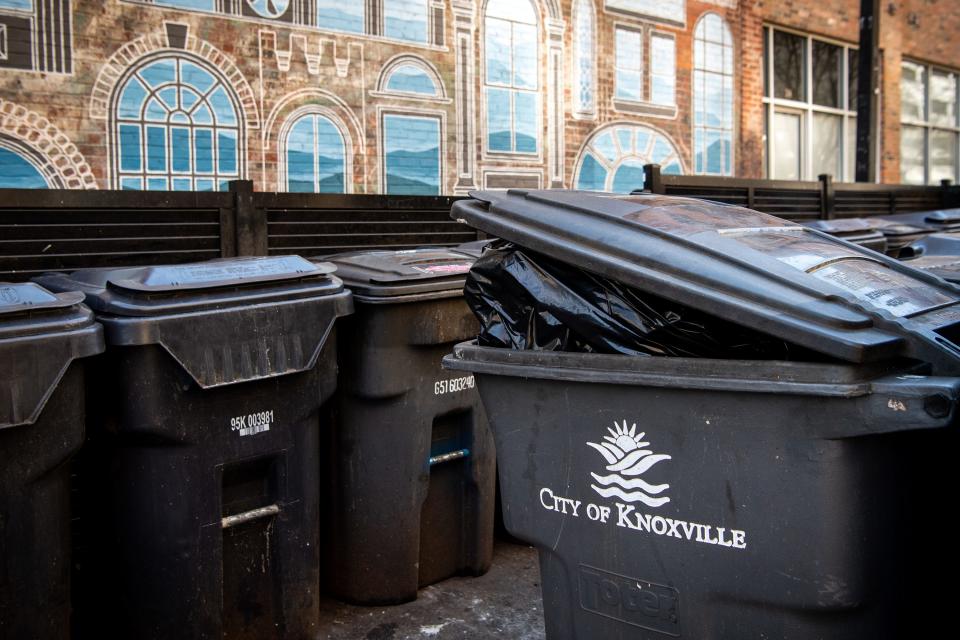Downtown Knoxville's garbage bins are ugly and smelly. Centralized compactors may help
Downtown Knoxville could look and smell different once the city replaces 700 garbage and recycling carts, or "toters," lining downtown streets with as few as 10 large compactors, based on advice in a new study.
In February, the Knoxville City Council approved $52,200 for solid waste consulting services to get an idea of how downtown could better handle trash as businesses grow. On Sept. 14, partners with Florida-based MidAtlantic Solid Waste Consultants and Vermont-based DSM Environmental Services presented their findings at a community meeting in the Old City.
They found the current collection system, which costs the city $557,676 annually, wastes money and requires intense labor. City employees collect waste from hundreds of carts every day, and twice on Fridays and Saturdays. Though the city places some carts in corrals, that does not always keep trash contained. The carts lead to litter, wet cardboard and odors, and can attract rodents more easily.
As an alternative, consultants recommend the city purchase about 10 shared compactors, seven for garbage and three for recycling, which would be collected once a week. The new system could save the city hundreds of thousands in operating costs each year and has already worked in cities like Columbia, Missouri, and Roanoke, Virginia.
Business owners, some of whom have experienced problems with the current system, expressed optimism about the potential change, which could take between 18 months to 3 years to implement.

How much would new solid waste system cost and who's paying?
Initial costs for shared compactors are between $800,000 and $1.1 million, depending on the number and size of compactors. A small 16-cubic-yard compactor costs about $32,000 and a large 30-cubic-yard compactor costs up to $40,000. Sites for the compactors, from parking lots to alleys, must be prepared with concrete and electricity. The city may have to lease some sites.
The annual operating costs would be between $296,000 and $422,000, far lower than what the city pays now, according to the study.
Downtown businesses do not pay for solid waste collection, but that could change under a new system. There are two options to cover the costs of maintaining compactors and collecting waste, said Ted Siegler, partner with DSM Environmental Services.
One option is to raise business taxes. Commercial properties are assessed at 40%, meaning a commercial property worth $100,000 has an assessed value of $40,000. Of that assessed value, the city currently taxes at a rate of $2.48 per $100.
The study says the city could cover the cost of a compactor system by raising the rate 17 cents, to $2.65 per $100. That would increase tax revenue from downtown business by $400,000. The city currently makes $5,815,921 in commercial tax revenue.
"It's one of the prettier downtowns, nicest downtowns that I've seen," Siegler said. "I've worked all over the country and all over the world. It's a great city and I think part of it is the city does a really good job of managing it, but there's a cost associated."
Another option is to charge businesses monthly, according to how much trash they produce. The businesses that produce the most trash, like busy Market Square restaurants, could pay anywhere between $125 and $800 a month. That's still far below what it would cost for a private compactor service, which runs around $3,500 a month.
It can be tricky to assess how to charge businesses, since data can't predict trash production based on the type of business or number of employees, Siegler said. In downtown Roanoke, residents and businesses use key fobs to open compactors, which track how often they dump trash, though a sophisticated system like that could be years away.
Some local business owners said they wouldn't mind paying a blanket rate.
"To me, it seems like it's a benefit to all of us, whether we're generating the trash or not," said Robin Easter, creative director of Robin Easter Design on Jackson Avenue. "Even though my office doesn't generate a lot, I'd be more than happy to pay just to have the area around my office look nicer."
Downtown residents don't pay for waste collection and they won't have to pay for the compactor system, either. The new system would not affect the public recycling drop-off at 227 Willow Ave. or smaller sidewalk trash cans for pedestrians.

How far will you have to walk to take out the trash?
One benefit of having so many garbage and recycling carts downtown is that businesses and residents can walk a few steps from their door to take out the trash. With a compactor system, they may have to walk trash a block or two because the nearby rolling bins would go away.
From two focus groups, Siegler said the consulting firms determined no one wants to walk more than a block or a block and a half to take trash. That will factor into where the compactors will go. Some compactor models come with a cart tipper, so businesses could take several bags of trash at once on a cart.
The study located some potential spots for compactors, but those won't be finalized until the city hears from residents and business owners, said Chad Weth, the city's public service director.
"I always like to remind people, garbage is not a pretty thing to talk about, but this is a great problem to have," Weth said. "We didn't have this problem 14 years ago when I started."
How fast is downtown Knoxville growing?
Downtown already produces around 4.2 millions pounds each year. A recent report from the Downtown Knoxville Alliance suggests that number could increase fast.
The report found downtown revenue had increased 19.6% in 2022, compared to the 4% average revenue growth over the last four years, a rate the alliance calls "simply jawdropping." 49 ground-floor businesses have opened downtown over the past three years and 12 more opened or are scheduled to open in 2023.
Daniel Dassow is a reporting intern focusing on trending and business news. Phone 423-637-0878. Email daniel.dassow@knoxnews.com.
Support strong local journalism by subscribing at knoxnews.com/subscribe.
This article originally appeared on Knoxville News Sentinel: Downtown Knoxville should add trash compactors, study suggests

